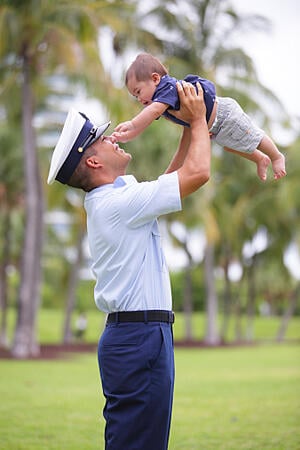When dad is deployed, families are affected. A study by Child Trends, found young children are especially vulnerable to a father's deployment. We must know the research and be intentional about helping military families and their children have the greatest opportunity to growing into well-adjusted adults. 
Nearly half-a-million children younger than six have an active-duty parent. Many children have two active-duty parents. Much like when we talk about about fatherhood from community-based and corrections settings, we also understand military families face unique challenges; especially when dad is deployed.
After reviewing a research brief by Child Trends, I was reminded of the importance of being educated on the stats if we are to help military fathers connect to their children. In Home Front Alert: The Risks Facing Young Children in Military Families, David Murphey reveals findings that can help us understand where the challenges and opportunities are with military fathers:
- 500,000 young children in military families have one and in some cases two-parents in service.
- 1 in 5 service members returning home from deployment in Iraq or Afghanistan report acute stress, depression, anxiety or PTSD.
- The reunion of a deployed parent with his or her family can be accompanied by new risks and challenges—particularly if the returning parent has serious physical or mental problems.
- Young children’s well-being typically mirrors the well-being of their caregivers. When their parent or other caregiver is depressed, anxious, or angry, they are likely to be unwell, or to have behavior problems. In some cases, these young children may be at risk for harm (maltreatment).
- A key strategy for supporting the well-being of children in military families is to see that the non-deployed parent has good emotional, social, and practical support.
- Families with a deployed National Guard or Reserves member are comparatively underserved, lacking the formal, and informal, supports typically available to their on-base peers.
- Many of these children will continue to have exceptional needs as they grow older.
David Murphey writes for Child Trends 5 Risks Facing Young Children in our Military Families:
More than two million children in the U.S. have had a parent deploy to Afghanistan or Iraq. When a parent goes to war and often for years afterward families are deeply affected. Young children are especially vulnerable, because they're physically and emotionally dependent on adults, and because their brain development can be disrupted by high levels of stress. When young children experience high levels of stress and trauma, the effects can continue well after their parents' military service ends, when their families may have less access to needed supports.
Child Trends examined the special circumstances of the lives of children under age six in military families. From the research, they offer five reasons why young children in military families might be at risk:
1) Deployment is stressful, even for the non-deployed: The parent who stays behind may experience depression, anxiety, and loss of financial/social support when their spouse deploys. Getting and keeping child care and health care may be a challenge. How well young children thrive under the circumstances of deployment can depend on how well the non-deployed parent copes with these challenges.
2) Young children may blame themselves: Young children may not understand the facts surrounding their deployed parent's leave. They may feel responsible for causing the losses, and develop emotional or behavioral problems because of this.
The research from Child Trends found that children's reactions are influenced by their age:
- babies may become listless, irritable, or stop eating
- toddlers may become more withdrawn or sad, or have more tantrums or sleep problems
- preschoolers may become more "clingy" or otherwise regress in their behavior, and may openly express their fears
- older children may experience emotional or behavioral problems, anxiety symptoms, and academic difficulties
3) Cumulative stress can put children at risk: Excessive stress changes brain processes that regulate emotion and behavior, and can have other damaging health effects. The quality of relationships, especially a young child's attachment to his or her parents, can increase negative effects.
When stress on the non-deployed parent reaches overload, good parenting may suffer. Children are at greater risk for abuse or neglect when a parent is deployed. The longer the deployment and number of tours may be especially difficult on families.
4) The end of deployment can bring new challenges: Just because the deployed dad returns home, doesn't mean everything is fine. It can take time for a returning parent to reintegrate into family life. Young children may need time to get reacquainted with a parent who, in some cases, they don't remember. When returning military members have suffered injuries (physical or psychological) young children can react with fear and anxiety.
The research points out that parental roles and styles of coping during deployment need to be renegotiated. There is an increased risk for domestic violence under these circumstances. About one in six service members returning from deployment in Afghanistan or Iraq returns home with post traumatic stress disorder, traumatic brain injuries, and other serious mental disorders. This adds to the risks faced by their children and families.
5) The armed forces has changed, and the system is straining to meet its needs: America's armed forces continues to change. Today, mothers with minor children make up about one in six members of the active-duty military. Children in dual-military families (about six percent of the total) can have their home lives completely overturned when the second parent is deployed.
While the military has a child care system that has been the envy of the civilian world, the system currently strains to meet the need. With increased numbers of parents in the Guard or Reserves (now nearly half of the total force), many families don't have the supports, formal and informal, that come with living on base.
As Child Trends does well to point out, promising approaches for addressing the needs of today's military-connected families include home visiting models and better access to mental health services, including cognitive-behavioral therapy for preschoolers affected by trauma and fatherhood programming can offer much-needed assistance.
What can you do to help military families? It's critical we help families who serve in our military especially while deployed and just returning from deployment.
Here are a few ways to help:
1) Regular "well-child" pediatric visits. Be involved in a military families life such that you help them take advantage of access to "well-child" visits.
2) Information on coping with separation. Depending on the age and stage of the child, talk with the children of deployed parents and be sure they are voicing their concerns.
3) Expanded mental health services. Don't wait for signs of depression or anxiety. Work to be pre-cautionary when it comes to mental and emotional issues that may come up with children.
4) Increased access to high quality child care. Learn what programs are available on your base and/or installation and get the help you need. For more on helping military fathers, visit our Military Fatherhood Programs page.
Are you a military family that has been affected by deployment? Do you know military families who have been affected by deployment? What have you seen be the most helpful in connecting fathers to their children during deployment?









